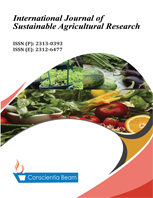Perception of Ethno-Veterinary Medicine among Poultry Farmers in Oyo State
DOI:
https://doi.org/10.18488/journal.70.2020.73.194.201Abstract
Getting to source for credit to finance poultry production as well as high cost of conventional medicines have been a major constraint among poultry farmers in Oyo state, Nigeria. The relatively low cost of ethno-veterinary medicine comes with added advantage such that when used for the treatment of poultry diseases, farmers would have the opportunity to reduce cost and increase their scale of production. Therefore, the study assessed perception of ethno-veterinary medicine among poultry farmers in Oyo state. Primary data were collected from 119 randomly selected poultry farmers. Well-structured questionnaire along with interview schedule was used to elicit information from the poultry farmers. Respondents’ mean age and years of experience were 44.3±12.3 and 9.3±7.0 years, respectively. Most of the respondents were male (90.8%), married (84%), sole proprietors (91.6%) with mean flock size of 6,255.8 ±2, 2462.5 birds. Majority (84.0%) of the respondents had low level of awareness of ethno-veterinary medicine. Lack of standardisation (2.9±0.2) ranked first among the constraint to the use of ethno-veterinary medicine. Most (65.5%) of the respondents had favourable disposition towards ethno-veterinary medicine. The study concludes that poultry farmers had favourable disposition towards ethno-veterinary medicine despite the constraints associated with its use and their low level of awareness. The study recommended the need for experimentation of medicinal plants with potentials to treat poultry diseases as well as increased sensitisation on the use of ethno-veterinary medicine to poultry farmers.

